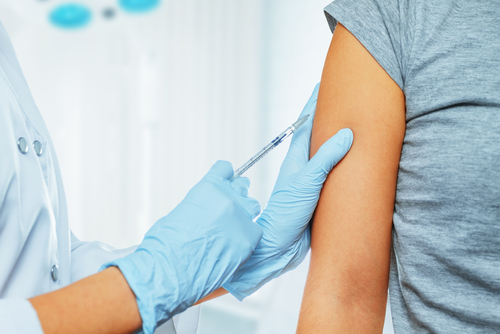Bexsero Vaccine Against MenB Bacteria Only Effective in 50% of aHUS Patients, Study Finds
Written by |

Bexsero, a vaccine developed as a treatment for serogroup B meningococci — the bacteria that can cause meningitis — is only effective in 50% of people with atypical hemolytic uremic syndrome (aHUS), a new study reports.
The study, “Low efficacy of vaccination against serogroup B meningococci in patients with atypical hemolytic uremic syndrome,” was published in the journal Bioscience Reports.
aHUS is a rare disease that develops due to uncontrolled activation of the complement system, which is a major part of the body’s immune system. It causes abnormal blood clots to form in small blood vessels in the kidneys, which can lead to various problems, including kidney failure.
Alexion Pharmaceuticals’ Soliris (eculizumab), an antibody designed to target and stop the activity of complement protein C5, currently is the first-line treatment for aHUS. However, treatment with Soliris has been associated with an increased risk of infections, particularly those caused by the bacteria known as serogroup B meningococci (MenB).
Due to that increased risk, vaccination against MenB is recommended for patients being treated with Soliris. Bexsero, a vaccine developed by GlaxoSmithKline (GSK), is estimated to be effective against 82% of MenB strains circulating in Europe.
However, Bexsero’s efficacy and immunogenicity — its ability to trigger an immune response — has not yet been determined among those with aHUS. One major issue is that the tests evaluating Bexsero’s effectiveness require patients to be off Soliris, since the medication is known to interfere with the vaccine’s immunogenicity.
Therefore, to address this question, a group of researchers in Germany recruited 14 aHUS patients (six men and eight women) who were not being treated with Soliris to be vaccinated with two doses of Bexsero.
Following the vaccination, the investigators measured the number of antibodies against MenB — known as serum bactericidal antibody (SBA) titers — in the patients’ blood.
The results indicated that only half (50%) of all patients who were vaccinated with Bexsero had protective SBA titers against MenB after receiving two doses of the vaccine. Protective SBA titers refer to the number of antibodies in the blood necessary to mount a proper immune response.
Additionally, antibody levels were relatively low in three of the seven participants who were considered to have protective SBA titers.
In all, 71% of the participants were on immunosuppressive treatment at either the first or second vaccination. The four who were not receiving any immunosuppressive treatment showed a protective bactericidal antibody response. This led investigators “to conclude that immunosuppressive treatment is a major opponent to successful vaccination.”
The time between the first and second vaccinations varied between one and 48 months, with a median of one month. However, the time between vaccinations was significantly longer in patients with protective SBA titers.
The researchers noted this is likely due to the fact that patients who waited a longer time between the two vaccinations were less likely to be on immunosuppressive treatment.
Given the findings, the researchers suggest the second dose of Bexsero should not be administered in a specific rigid time frame, but instead should be planned on an individual basis to take into account the patient’s own immunosuppressive treatment schedule.
“Efficacy of vaccination against MenB is insufficient in patients with aHUS. Response to vaccination seems to be hampered by immunosuppression,” the researchers said.
“In addition to vaccination under lowest immunosuppressive treatment possible and measurement of bactericidal antibody titers in patients with expected future complement blockade, maintenance of antibiotic prophylaxis for patients on eculizumab treatment and up to three month after discontinuation is recommended,” they added.




